What homeless people think of Palm Springs’ new law on sleeping in public
With the passage of a new homelessness ordinance, Palm Springs police officers will have expanded authority to arrest people for sleeping in public and setting up encampments on public property.
The ordinance codifies for the first time procedures for the clearing of structures erected by homeless people and establishes fines and a potential six-month jail term for violations.
Police say the ordinance will help officers deal with a relatively small subset of problematic people who have refused to accept help. But critics have raised concern over the broad language of the law.
We spoke to some of those who will be most impacted to get their perspective on the new development in the city's approach to homelessness.
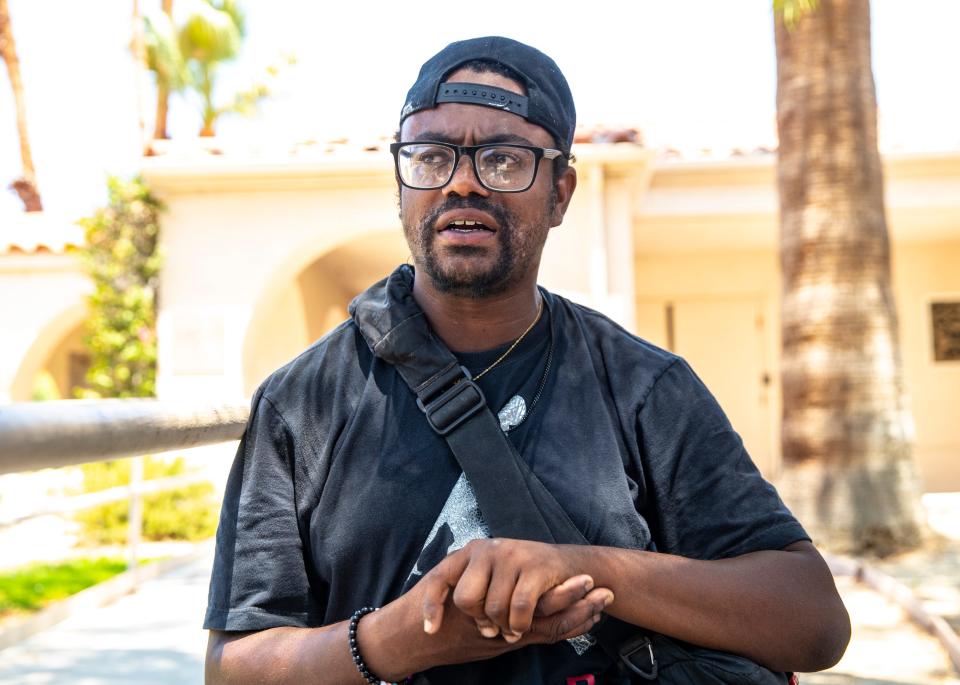
Diamond Love
Diamond Love, 32, has been sleeping outside in Palm Springs since losing his housing in December. He said he was laid off in October and has been trying ever since to find a new job that will bring him stability.
The Palm Springs ordinance relies on beds being available at the homeless navigation center. The city intends to direct homeless people to the shelter, and officials have said arrests will only be made after multiple referrals fail.
However, Love said he has been banned from the facility after being assaulted by another patron. This could create an untenable situation if he continues to live in Palm Springs as he will be unable to stay in one of the few shelters in the area.
"What do you do now, when you're banned and the police are saying that you have no other option to go anywhere else?" he said. "For me, I don't want to jeopardize my clean record over some trespassing."
The new law, however, says police can only enforce the ban on sleeping in public at a time when a shelter bed is open and "is reasonably available to that specific person at the time."
Love said he has no family to rely on, and worries about being sent to jail. He described himself as sleeping on concrete every night while trying to keep clean and survive as daytime temperatures exceed 120 degrees.
"I might be so tired to where I accidentally fall asleep on the street," he said. "That's nothing that I would like to do, so you always have to be extra careful and cautious. If I was told to move, I would have to move because I would not want to get arrested."
He keeps his belongings in two suitcases and is working with case workers to find another job. In the meantime, he said the "reality" was setting in over the new ordinance, which will not take effect until an expansion to the homeless navigation center which is expected to be completed in September.
"I guess I can gratefully say that (the law) was only Palm Springs, and it's not the other cities," he said. "So you can go and move around and still have your freedom."
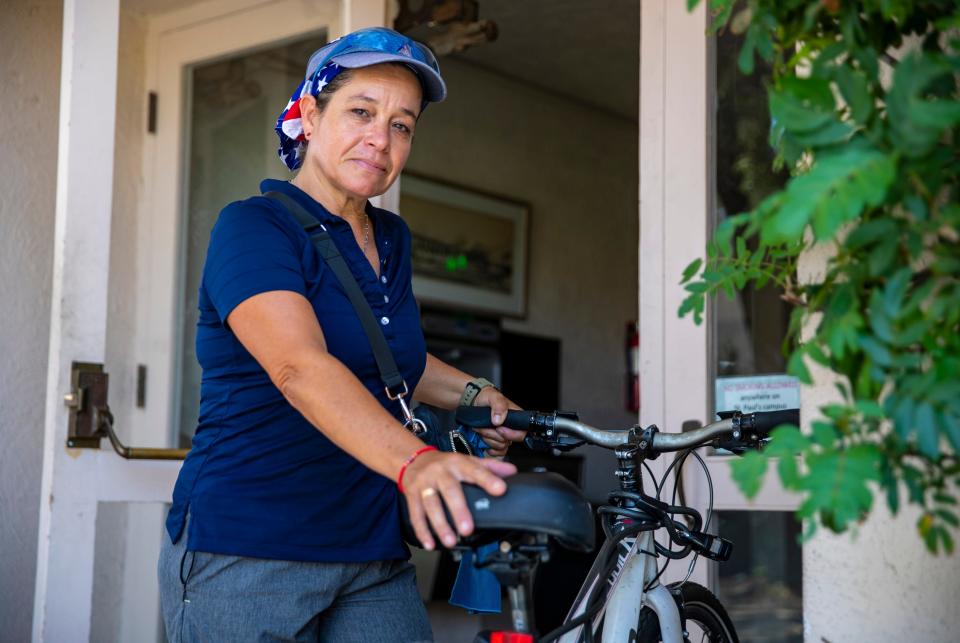
Laura Sanchez
Laura Sanchez, 53, has been homeless for a year and a half after experiencing issues with rooms she has leased that she would not disclose. She gets around with her bicycle and said she has a tent she could use in storage, but is now reconsidering given the change in the law.
"I tried to find a place for myself, but everything is so expensive," she said.
She usually sleeps on the street, she added, occasionally using a friend in Desert Hot Springs for temporary shelter. She said she has faced challenges finding a job, and is considering leaving the desert in search of opportunity.
She disparaged Palm Springs' homeless ordinance, saying many people have nowhere to go.
"It's stupid because what do they want people to do?" Sanchez said. "They don't have a choice. They need to sleep somewhere."
City officials say police will only arrest someone when shelter beds are available and that the navigation center keeps five beds open each night in case officers need to bring someone there.
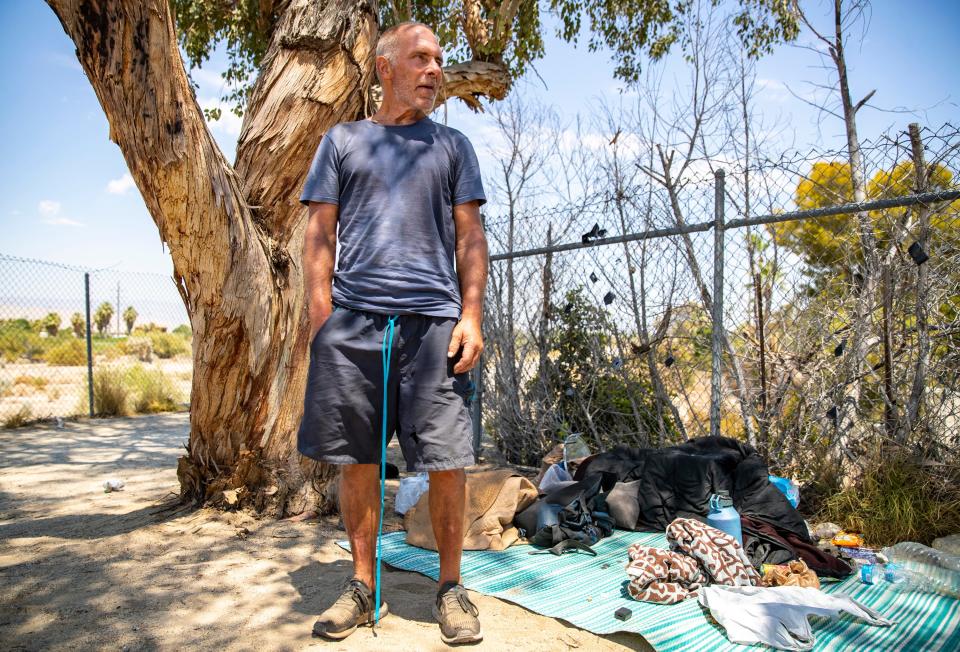
Jonathon Shields
Jonathon Shields, 53, has been homeless since 2016, when he was released from prison after serving time for drug charges. He said he survives by selling recyclable materials, which earns him enough money for food and necessities, but not much else.
"Recycling, it's like one of the hardest things I've done in my life," he said. "Lay your belly across a hot dumpster one time and you'll never forget it. Trying to do that when it is 110 degrees in a little cement box. It's like 160 in there. It's brutal, but it makes money."
He said he does not have a government-issued ID, which makes it difficult for him to find work. Yet, his lack of an address along with his lack of a current ID makes it difficult for him to acquire a new one. Being a felon adds to the difficulty of finding a new job.
"Somebody told me the other day; he goes, 'I can't hire you because you don't have a place to stay.' Well, how do I get a place to stay if I can't get a job?" Shields said. "It's a catch-22 and it makes me kind of bitter."
Shields sees a lack of resources for the homeless locally, especially when it comes to options for housing.
"There's a lot of good people out here that help people," he said. "They just need to get something more stable."
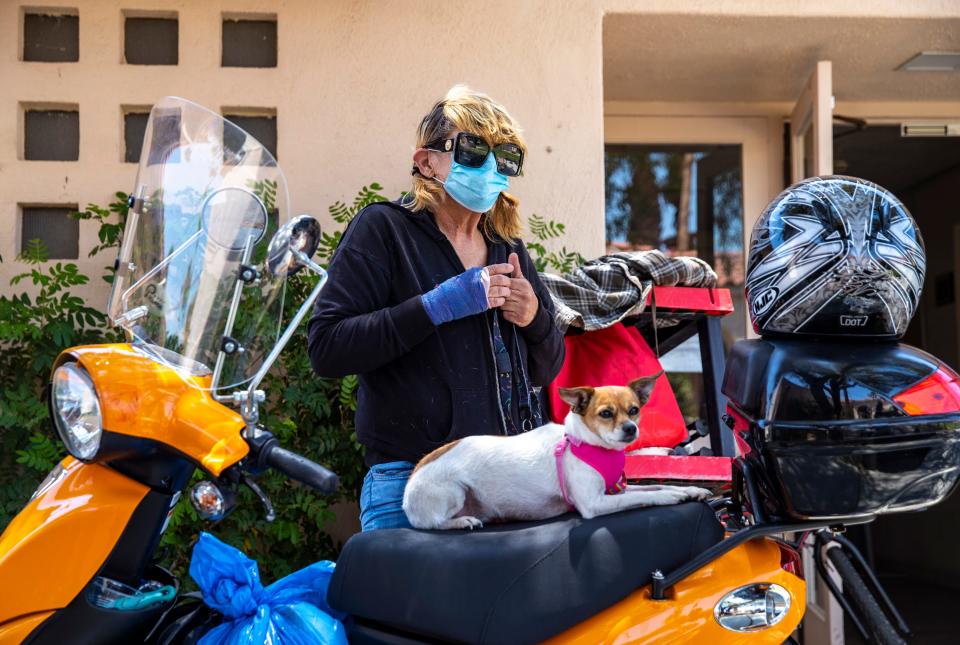
Christina Barrington
Christina Barrington, 60, worked as a nurse at a local hospital before a dispute with a surgeon resulted in her losing the job. She said the incident, which occurred in 2012, caused her mental health problems to become exacerbated.
"Once I lost my job, I just felt like I needed to live in the dirt," she said. "I walked away from my daughter and everything I owned. I just left and lived in Coachella in the dirt."
After several years and an extended stay at Martha's Village in Indio, she said she was able to secure housing through financial assistance provided by Catholic Life Ministries. She now lives in an apartment while going through a behavioral health program.
"I want to be able to go back to work and be self-supporting again," she said.
Barrington believes parts of Palm Springs should be open to camping so people will have somewhere to go during tough times. She said hundreds of people are experiencing homelessness in the city, more than can be accommodated by the city's navigation center.
A 2023 point in time count found 239 unsheltered people in Palm Springs. The navigation center, which is partially complete, has 50 shelter beds available.
"I don't think they have enough space," she said. "I think if they had a section where everybody could camp out and stay away from the businesses like the business owners want, I think that would be feasible. It's imperative that people get housed as well as for businesses to be able to do business."
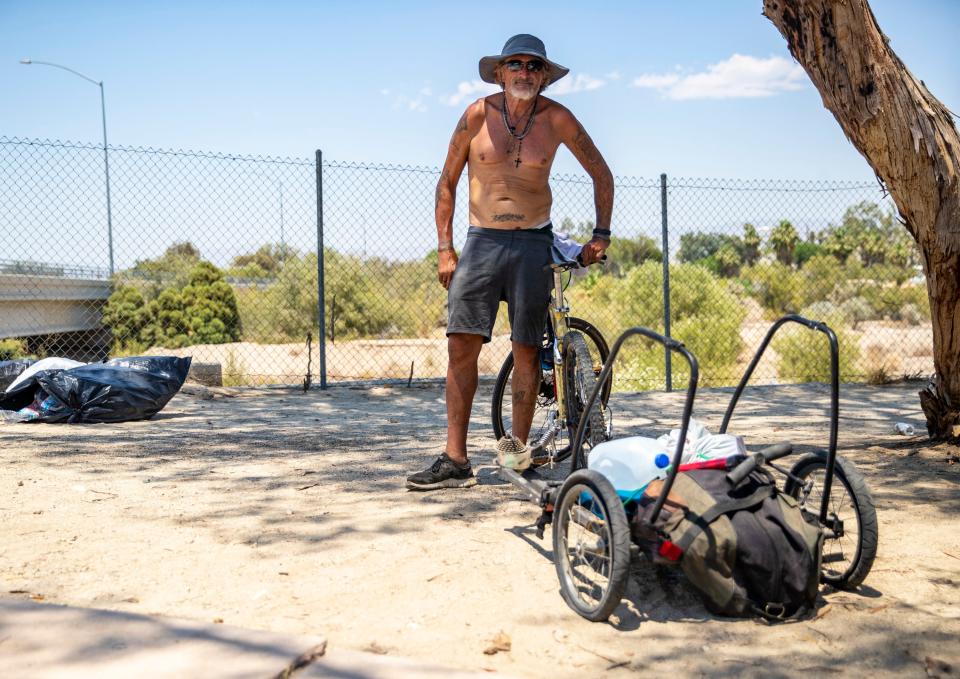
Steve Grant
Steve Grant, 54, has been homeless for the last 13 years after a career as a truck driver that ended during the financial downturn of 2008. He said he moves between different cities and lives off of money he earns from recycling.
"They should post where we can (sleep) and can't," he said of the city's new homeless ordinance. "That gives us some type of chance."
Grant added that a paying gig, along with outpatient programs, would benefit the city's homeless population. He said he hoped the new law would not become a crutch with which to keep people down.
"A lot of people are a paycheck away from being homeless," he said. "They're struggling to make it."
Sam Morgen covers the city of Palm Springs for The Desert Sun. Reach him at smorgen@gannett.com.
This article originally appeared on Palm Springs Desert Sun: Palm Springs’ homeless react to public sleeping law

